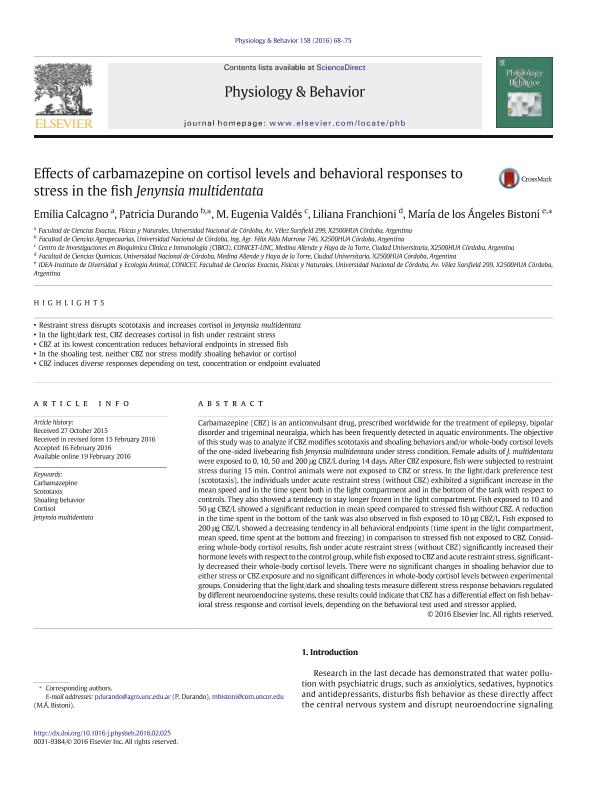Artículo
Effects of carbamazepine on cortisol levels and behavioral responses to stress in the fish Jenynsia multidentata
Calcagno, Emilia ; Durando, Patricia Evelina; Valdés, María Eugenia
; Durando, Patricia Evelina; Valdés, María Eugenia ; Franchioni, Liliana; Bistoni, Maria de Los Angeles
; Franchioni, Liliana; Bistoni, Maria de Los Angeles
 ; Durando, Patricia Evelina; Valdés, María Eugenia
; Durando, Patricia Evelina; Valdés, María Eugenia ; Franchioni, Liliana; Bistoni, Maria de Los Angeles
; Franchioni, Liliana; Bistoni, Maria de Los Angeles
Fecha de publicación:
05/2016
Editorial:
Pergamon-Elsevier Science Ltd
Revista:
Physiology And Behavior
ISSN:
0031-9384
Idioma:
Inglés
Tipo de recurso:
Artículo publicado
Clasificación temática:
Resumen
Carbamazepine (CBZ) is an anticonvulsant drug, prescribed worldwide for the treatment of epilepsy, bipolardisorder and trigeminal neuralgia, which has been frequently detected in aquatic environments. The objectiveof this study was to analyze if CBZ modifies scototaxis and shoaling behaviors and/or whole-body cortisol levelsof the one-sided livebearing fish Jenynsia multidentata under stress condition. Female adults of J. multidentatawere exposed to 0, 10, 50 and 200 μg CBZ/L during 14 days. After CBZ exposure, fish were subjected to restraintstress during 15 min. Control animals were not exposed to CBZ or stress. In the light/dark preference test(scototaxis), the individuals under acute restraint stress (without CBZ) exhibited a significant increase in themean speed and in the time spent both in the light compartment and in the bottom of the tank with respect tocontrols. They also showed a tendency to stay longer frozen in the light compartment. Fish exposed to 10 and50 μg CBZ/L showed a significant reduction in mean speed compared to stressed fish without CBZ. A reductionin the time spent in the bottom of the tank was also observed in fish exposed to 10 μg CBZ/L. Fish exposed to200 μg CBZ/L showed a decreasing tendency in all behavioral endpoints (time spent in the light compartment,mean speed, time spent at the bottom and freezing) in comparison to stressed fish not exposed to CBZ. Consideringwhole-body cortisol results, fish under acute restraint stress (without CBZ) significantly increased theirhormone levelswith respect to the control group,while fish exposed to CBZ and acute restraint stress, significantlydecreased their whole-body cortisol levels. There were no significant changes in shoaling behavior due toeither stress or CBZ exposure and no significant differences in whole-body cortisol levels between experimentalgroups. Considering that the light/dark and shoaling tests measure different stress response behaviors regulatedby different neuroendocrine systems, these results could indicate that CBZ has a differential effect on fish behavioralstress response and cortisol levels, depending on the behavioral test used and stressor applied.
Palabras clave:
Carbamazepine
,
Scototaxis
,
Shoaling Behavior
,
Cortisol
,
Jenynsia Multidentata
Archivos asociados
Licencia
Identificadores
Colecciones
Articulos(CIBICI)
Articulos de CENTRO DE INV.EN BIOQUI.CLINICA E INMUNOLOGIA
Articulos de CENTRO DE INV.EN BIOQUI.CLINICA E INMUNOLOGIA
Citación
Calcagno, Emilia; Durando, Patricia Evelina; Valdés, María Eugenia; Franchioni, Liliana; Bistoni, Maria de Los Angeles; Effects of carbamazepine on cortisol levels and behavioral responses to stress in the fish Jenynsia multidentata; Pergamon-Elsevier Science Ltd; Physiology And Behavior; 158; 5-2016; 68-75
Compartir
Altmétricas



